四足机器人单腿结构设计及其基础电机控制系统研究(含CAD图,SolidWorks三维图)(任务书,开题报告,外文翻译,论文说明书20000字,CAD图16张,SolidWorks三维图,DSP电机控制程序,Simulink,答辩PPT)
摘要
在如今科学技术蓬勃发展的时代,四足机器人逐渐成为了机器人研究领域的一项热门,其未来强大的功能和潜在的社会价值都是可以预见的。
本文以四足机器人机械单腿为研究对象,先参考了生物犬类腿部骨骼结构和运动特性,以结构相似、运动相似、低惯量为设计原则,设计出机械腿的肢段结构,并对其进行了运动学分析。四足机器人机械单腿采用两个独立的无刷直流电机控制系统,一个控制机械腿的髋关节,另一个控制机械腿的膝关节,两台电机置于髋部之上。无刷直流电机的控制系统以TMS320F28335 DSP作为控制器,搭配三相星型联接全桥驱动电路,采用速度-电流双闭环控制策略,PID算法采用增量式算法。
在此控制框架下,先后用软件建模仿真和硬件实验的方法,实现了电机的控制,并验证了控制系统的速度响应、稳定性、抗干扰能力等,得到与理论分析相近的结果。
本文的研究成果为以后在足式机器人和电机控制领域的学习打下了重要的基础。
关键词:四足机器人;机械单腿结构设计;无刷直流电机;DSP;双闭环控制
Abstract
In the era of booming development of science and technology, quadruped robot has gradually become a hot topic in the field of robot research. Its powerful functions and potential social values can be predicted in the future.
This paper takes the mechanical single leg of quadruped robot as the research object, first referred to the biological dog leg bone structure and motion characteristics, with the structure similar, movement similar, low inertia as the design principle, made a design of the mechanical leg segment structure, and analysed its kinematic performance. The mechanical single leg uses two independent brushless dc motor control systems, one for them controls the hip joint of the robot leg and the other for the knee joint of the robot leg. The two motors are placed on the hip. The motor control system takes F28335 DSP as the controller, three-phase star-connected full-bridge drive circuit as the driver, adopts the speed-current double closed-loop control strategy, and the PID algorithm adopts the incremental algorithm.
Under this control framework, the control of the motor is realized by software modeling、 simulation and hardware experiment successively, and the speed response, stability and anti-interference ability of the control system are verified. The results are close to the theoretical analysis.
The research results of this paper lay an important foundation for the future study in the field of foot robot and motor control.
Key Words:quadruped robot; mechanical single leg structure design; brushless DC motor; DSP; double closed loop control
本文主要结构
从本文的研究内容出发,将全文划分为五个章节进行论述,具体如下:
第一章:绪论。阐述本文的研究背景和意义。结合文献资料,介绍国内外四足机器人发展现状,确定本文的研究内容和研究目标。
第二章:四足机器人机械单腿结构设计及运动学分析。基于生物犬的生理结构和运动特点,设计四足机器人的单腿结构。根据结构进行正向运动学分析和逆向运动学分析。
第三章:四足机器人机械单腿基础电机控制系统设计。首先建立了整体控制框架和双闭环的控制策略。然后利用MATLAB软件进行了建模和仿真分析,最后搭建了硬件控制电路和完成了控制程序设计。
第四章:无刷直流电机控制实验。通过之前所搭建的实验平台,进行了无刷直流电机速度响应、相电流相电压采集、PWM控制信号采集等实验,验证系统的性能。
第五章:总结与展望。总结了本篇文章取得的研究成果,并指出了下一步所需的优化和工作。
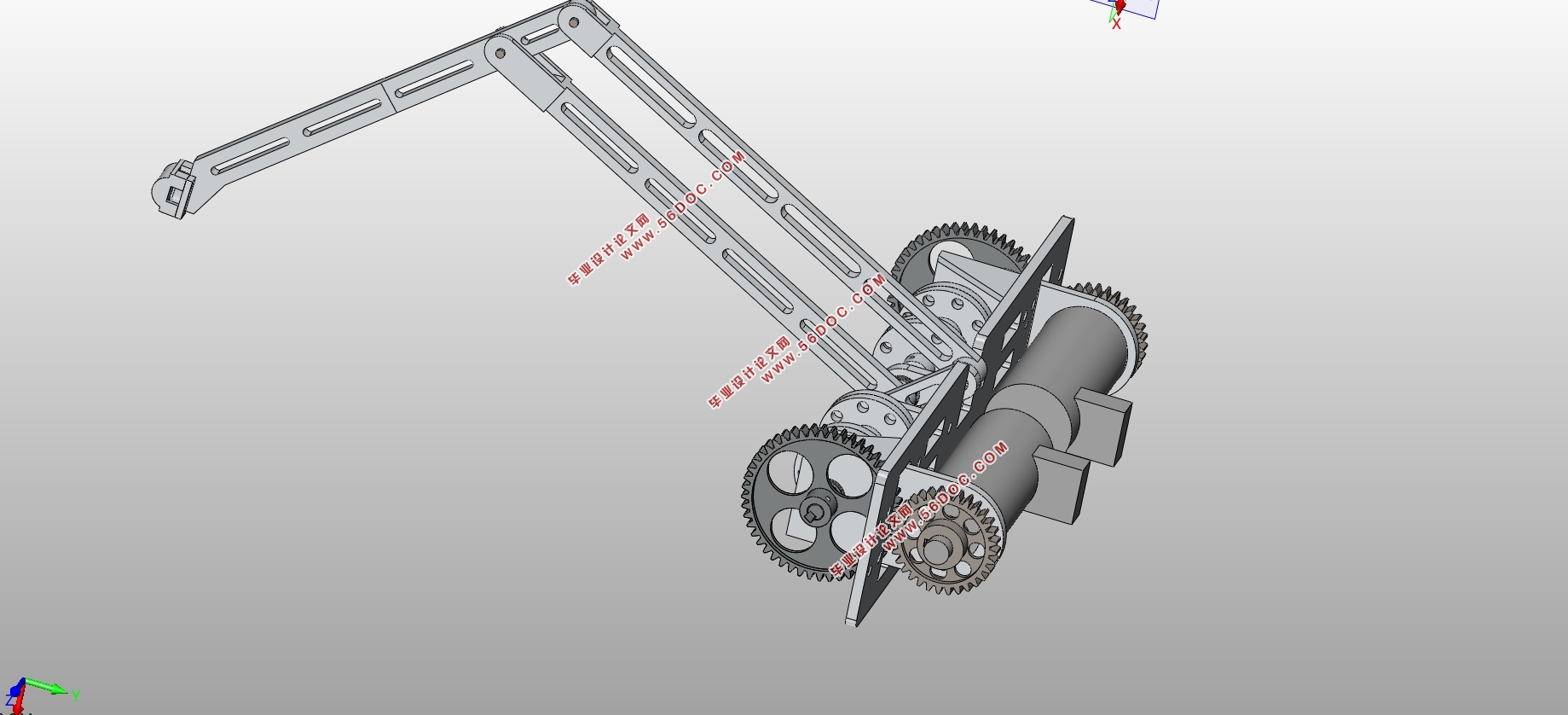
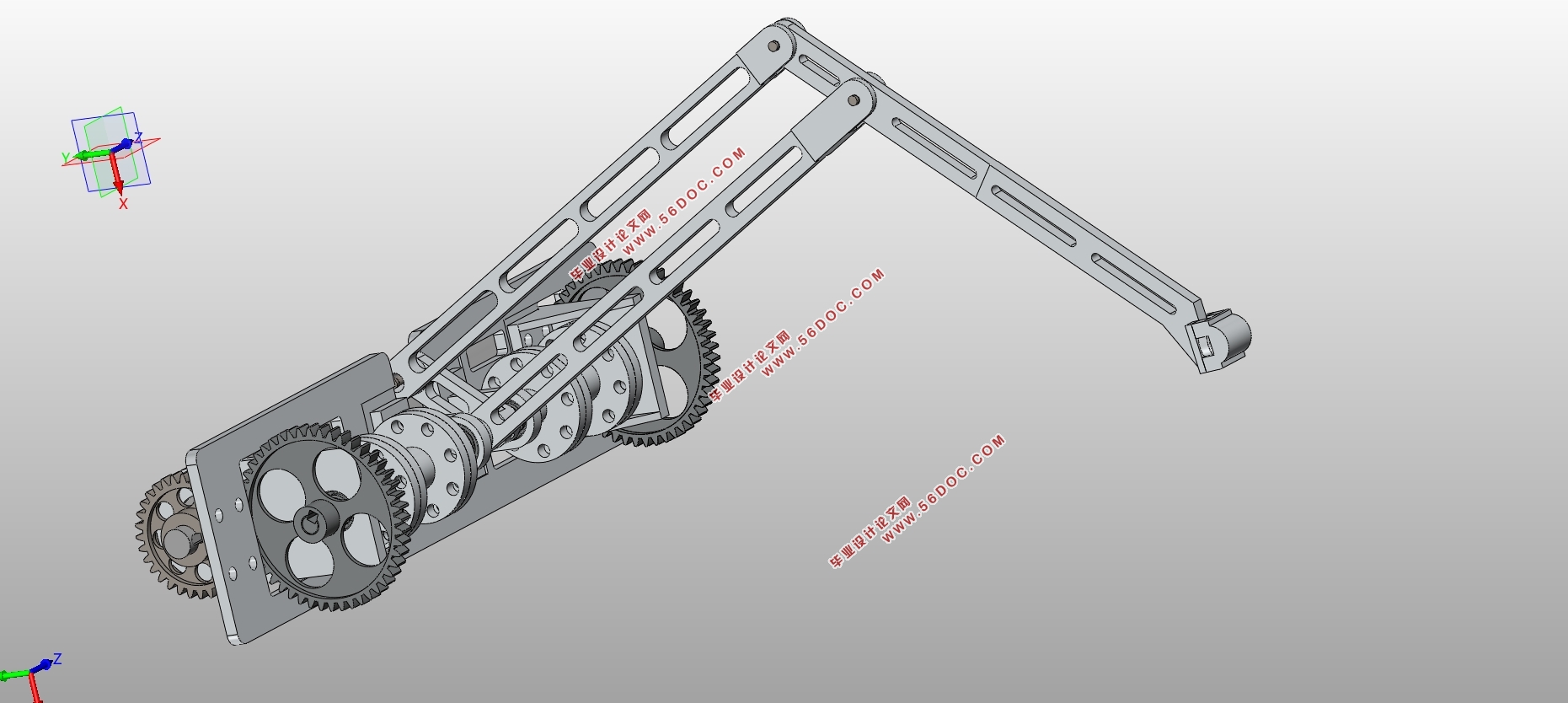
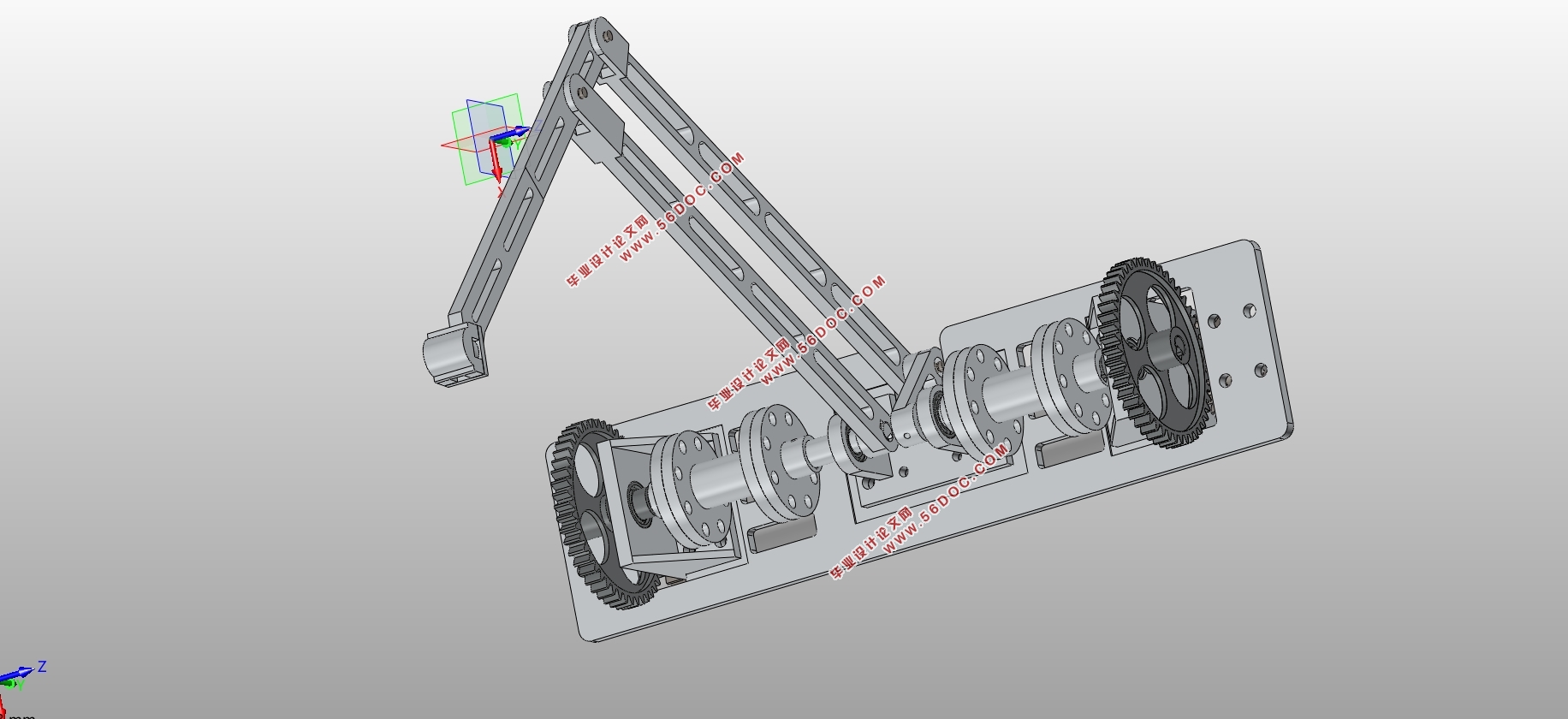
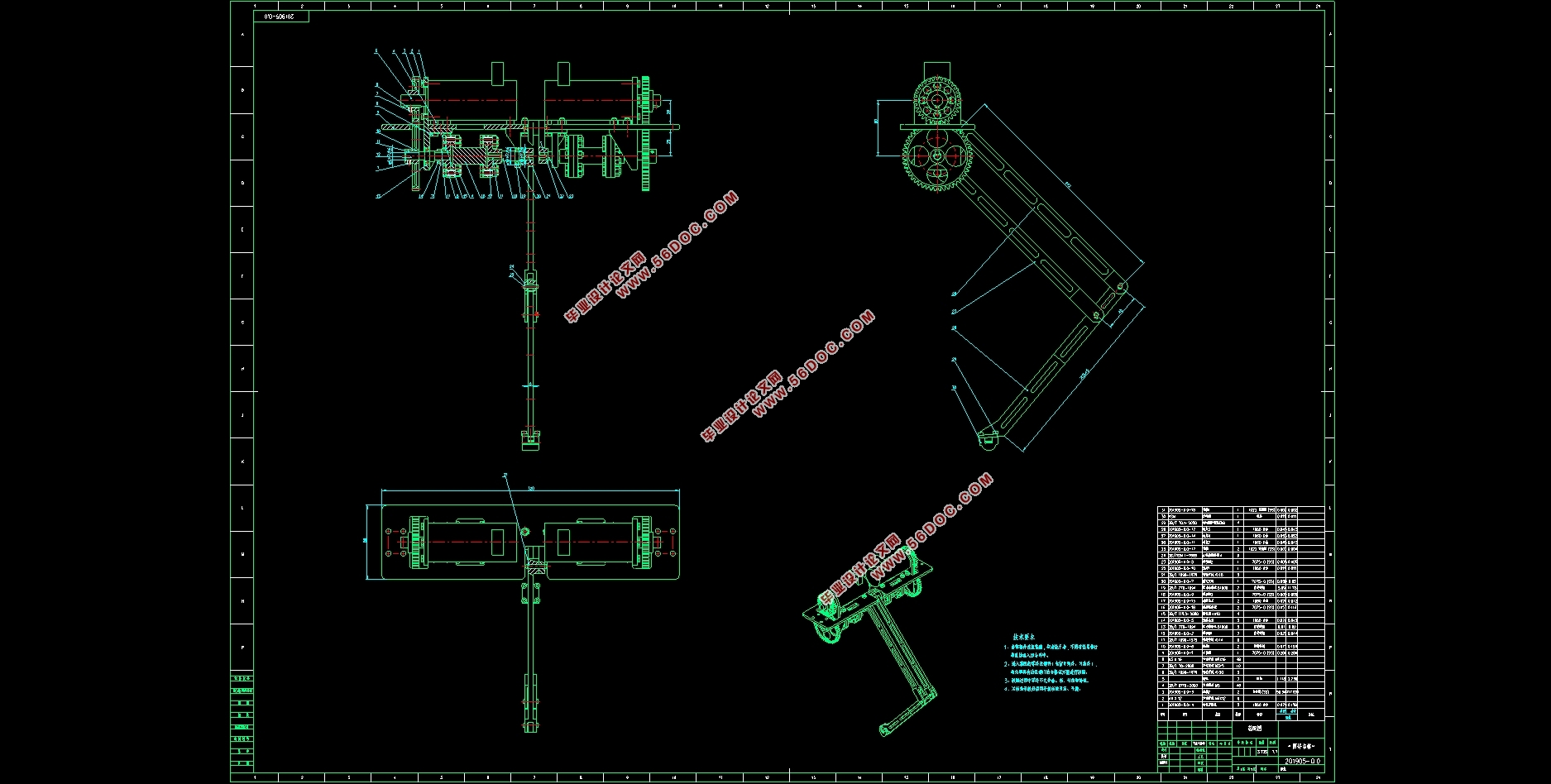
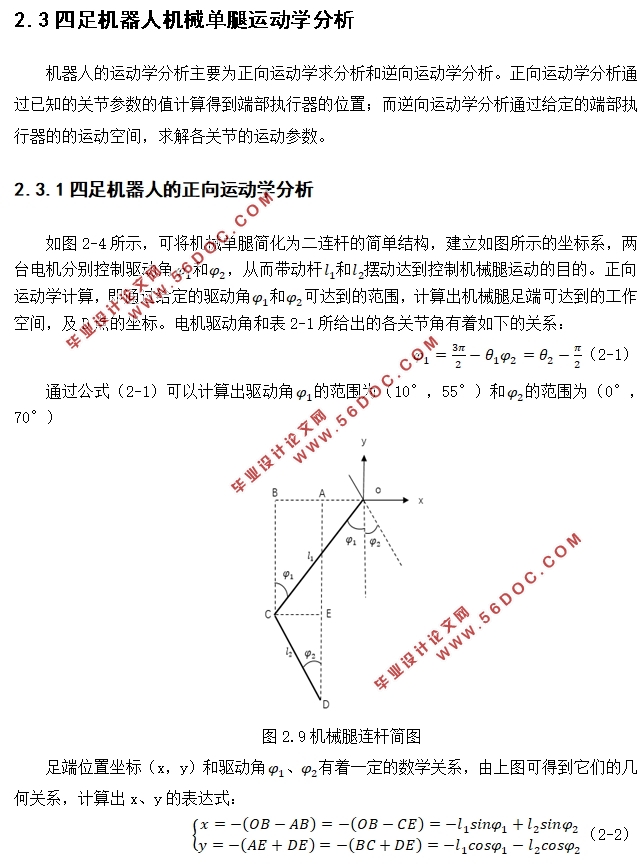
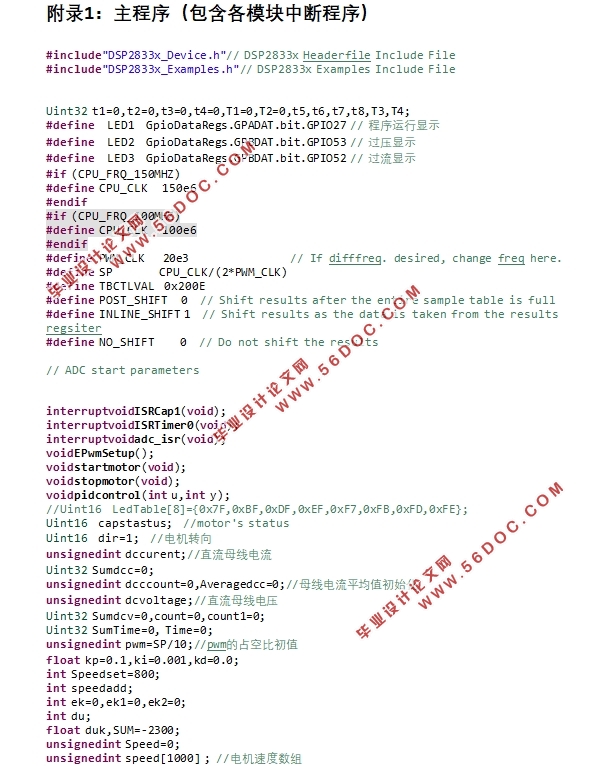

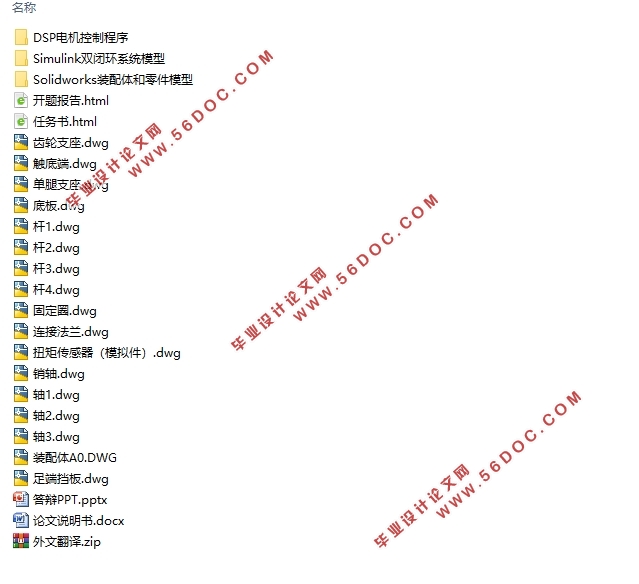
目录
第一章 绪论 1
1.1研究背景与意义 1
1.2四足机器人国内外研究现状 2
1.2.1国外研究现状分析 2
1.2.2国内研究现状分析 3
1.3研究的主要内容和目标 3
1.4本文主要结构 4
第二章 四足机器人机械单腿结构设计及运动学分析 5
2.1犬类腿部生理结构和关节运动特点分析 5
2.1.1犬类腿部生理结构 5
2.2.2犬类腿部关节运动特性 5
2.2四足机器人机械单腿结构设计 6
2.2.1设计原则 6
2.2.2四足机器人机械单腿结构及各项参数的确定 6
2.3四足机器人机械单腿运动学分析 10
2.3.1四足机器人的正向运动学分析 10
2.3.2四足机器人的逆向运动学分析 11
2.4本章小结 12
第3章 四足机器人机械单腿的控制系统设计 13
3.1无刷直流电机内部结构及控制原理 13
3.1.1无刷直流电机内部结构 13
3.1.2无刷直流电机驱动原理 14
3.2基于DSP的无刷直流电机控制系统控制方案 15
3.2.1基于DSP的无刷直流电机控制与驱动电路 15
3.2.2无刷直流电机双闭环控制策略 16
3.3基于MATLAB的无刷直流电机控制系统建模与仿真 18
3.3.1控制系统开环数学模型计算及分析 18
3.3.2控制系统的Simulink建模和仿真 21
3.4控制系统的硬件电路及控制信号波形配置 24
3.4.1控制器和驱动器的选择及电路连接 24
3.4.2控制信号波形配置 26
3.5控制系统软件程序设计 28
3.5.1主程序设计 29
3.5.2 eCAP捕获中断服务程序设计 29
3.5.3 ADC采集中断服务程序设计 31
3.6本章小结 32
第四章 无刷直流电机的DSP控制实验 33
4.1无刷直流电机测速实验 33
4.2 PWM信号检测实验 34
4.3相电流检测实验 35
4.4霍尔信号检测实验 35
4.5三相反电动势采集实验 36
4.6本章小结 36
第五章 总结与展望 37
5.1总结 37
5.2展望 37
参考文献 39
致谢 41
|

















